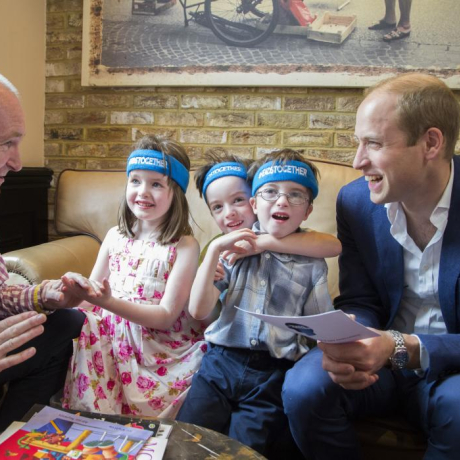The Duke of Cambridge joins a Heads Together Father's Day breakfast
Published

The Duke of Cambridge talked to dads and children of all ages along with mentors and the children they support, at a Heads Together Father’s Day breakfast earlier this week.
Heads Together is encouraging people who are celebrating Father’s Day to take the ‘Heads Together Father’s Day Challenge’. The Duke compèred the light-hearted quiz challenge for some of the dads, father figures and children at the Father’s Day breakfast as well as hearing their personal experiences of parenthood and mentoring.
The people that The Duke talked to at the breakfast included:
- Michael Conneely from Northamptonshire and his 5 year-old triplets, Michael, Ciara and Tadgh, who were born premature.
- Father and daughter from Truro, Chris and Harriet Skidmore (21). Harriet was supported by her dad when she took a year out from university due to extreme Generalised Anxiety Disorder.
- Lone father Brian Matthews and his son Dante Matthews (9) from north London who have sought support to improve their communication and relationship.
- Don Simpson, a father from Kent who developed Post-Traumatic Stress Disorder through his experiences in the military and his adult daughter Carly.
- David Wright, a dad from Acton in west London who sings in Chaps Choir, and his son Sugar-Ray Wright (11).
- Paul and Norman Scates, a father and son from Bournemouth that support each other with their bipolar disorder.
- Single Dad Peter Perren and 6 year-old son James, who were supported when James first moved to London to live with his Dad a year ago.
- Scott Casson-Rennie, a father in a same-sex couple and their adopted son Jacob Casson-Rennie (9), who live in Cambridgeshire.
- Carl Reid a mentor who has founded a community sports club from a south London, with the son of a family friend, Brendan Brown (13), who he has supported with mentoring, school work and life skills.
I really believe that a child's mental health is just as important as his or her physical health.
The Duke of Cambridge
The Duke also wrote an article for the Heads Together website about how the campaign, which he is spearheading with the Duchess of Cambridge and Prince Harry, wants to help dads and father figures have the confidence to talk to children and each other about their feelings:
Today I celebrate my third Father's Day as a father. For me it is a day not just to celebrate how fortunate I am for my young family, but to reflect on just how much I've learned about fatherhood and the issues facing fathers in all walks of life. In particular, it is a time to reflect on my responsibility to look after not just the physical health of my two children, but to treat their mental needs as just as important a priority.
Along with Catherine and Harry I have been spending a lot of time working on issues around mental health.
What we have seen time and time again is that so many of the issues that adolescents and adults are dealing with can be linked to unresolved childhood challenges - addicts that were not getting treatment for a serious psychological condition that started in their teens; men who committed suicide who had been depressed since they were in primary school; homeless teenagers who could not confront significant emotional challenges.
While the circumstances of any one situation are unique, it is clear that many families could have been helped if they had found it easier to talk openly about mental health challenges in the home. And I have been really disheartened to learn that even with all the progress made in recent years, many parents would still be ashamed if their children had a mental health problem.
Recent surveys have found that over half of parents have never broached the topic of mental well-being with their children, and a third would feel like failures if their child needed help. That's so sad - no parents whose child needs help is a failure. Taking the next step and actually getting help is what matters.
We know that fathers find asking for help harder than mothers. Less than a third of fathers say they believe that the emotional needs of their children is a fundamental priority. It is often said that fathers can often find it hard to talk about their own feelings so there's no wonder they struggle to speak to their son or daughter about the topic.
But we don't really have a choice. I really believe that a child's mental health is just as important as his or her physical health.
One of the great generational shifts that has taken place in society is how much attitudes to mental health have changed: we know today what was not well known or acknowledged in the past. A fifth of children will have a mental health issue by their eleventh birthday. And left unresolved, those mental health issues can alter the course of a child's life forever.
So on this Father's Day, I encourage all fathers to take a moment to ask their children how they are doing. Take the opportunity to discuss how you are coping with life and fatherhood with your wife, partner or with your friends. And know that if your son or daughter ever needs help, they need their father's guidance and support just as much as they need their mother's.


